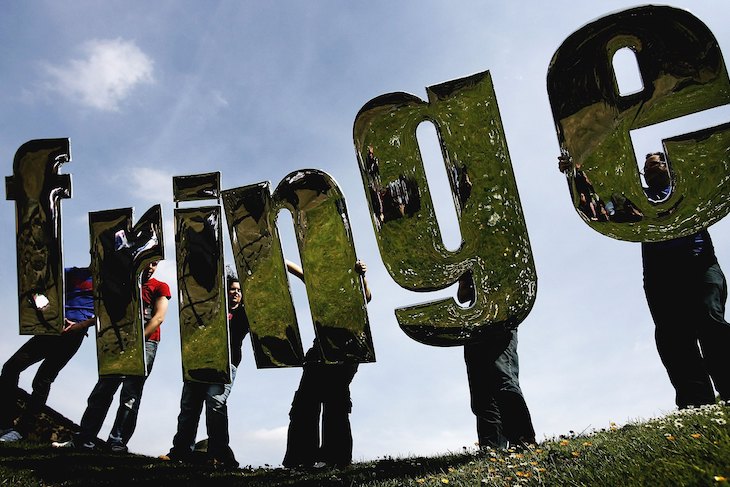Edinburgh. Why do comics do it? We almost invariably lose money. Even if you don’t pay for your venue, the cost of accommodation is astronomical — I’ve met Edinburgh natives who pay their annual mortgage with the rent for August. You could conceptualise it as a loss-leader; but there are 1,333 comedy shows this year, and a loss-leader that can’t lead to anything is just a loss.
Yet comics still go up. Partly because, for three weeks, there’s the thrill of having a real job: instead of travelling for gigs, you’re at the same place at the same time every day. Partly because comedy is a serious business in Edinburgh: you wander around spotting your face on posters, and can almost imagine you are some kind of a big deal — and perhaps, for those three weeks, you are. But mostly because it makes you a better performer. Doing an hour-long show every day is like training at altitude — your first gig back on the circuit, when you only do 20 minutes, is always the easiest gig of the year.
The problem with the Edinburgh hour was summed up by Ade Edmondson: ‘I find [stand-up] dull as an art form. Twenty minutes is all right… but then I wish they’d bring on the spoon-bender or the dancers… I mean, two boiled eggs, that’s enough. You don’t need four boiled eggs, do you?’ An hour of even the best comedian can feel like four boiled eggs — and comedians know this. We talk about the ‘40-minute lull’, when the audience seems unable to take any more comedy. (There’s a reason why comedy clubs, which rely on returning trade, book comics for 20 to 30 minutes.) I can’t find any research explaining why it should come at 40 minutes — my own theory is that you’re primed by the memory of school lessons — but the effect exists. At every show I’ve been to recently, I first checked my watch at exactly 40 minutes in — and they were all good shows.
Surely the way round this would be to do 40 minutes of comedy. But that’s not the way in Edinburgh. The venues offer hour-long slots; you need 50 minutes to be considered for the Edinburgh Comedy Award. (I’ve always found it odd that comedy’s most influential showcase is one to which comedy, as an art form, is inherently unsuited.) The old-fashioned way to get over the lull is to switch form, if not spoon-bending then a musical number; but only Stewart Lee gets away with that now. Other comics make a flaw into a feature: Mark Watson appoints an audience member to chant ‘Lull! Lull!’ at the 40-minute mark. Others, more subtly, have a sad bit at that point, which you’re not supposed to laugh at anyway; or tell a story throughout the show, the resolution of which keeps the audience’s attention. Even purists throw in ‘callbacks’, references to earlier jokes — if you’re not laughing, you can be reminded of a time when you were. (This psychological triggering is the reason callbacks work, not because, as people think, they look clever: clever callbacks don’t work when the initial joke wasn’t funny. Besides, physical cues — repeating a gesture that accompanied a previous laugh — are, if anything, more effective.)
These are all perfectly legitimate as structural devices. But the whole point of a structural device is to support the comedy — too often in Edinburgh the comedy supports the structural device.
Take the show that (jointly) won last year’s Edinburgh Comedy Award. It went up on Netflix a month ago, and caused a sensation: the New York Times calls it ‘Comedy-Destroying, Soul-Affirming Art’; the Washington Post said it had changed comedy forever. Hannah Gadsby’s ‘Nanette’ hit at just the right time: apart from the content — she’s an Australian lesbian, talking about life for women in the post-#MeToo era — it was one of the first examples of the ‘Edinburgh hour’ that Netflix put out on an American market used to joke-filled comedy specials.
And it does have jokes. Good jokes. But Gadsby wants to do more than tell good jokes. As she once said, ‘If the only reason to be on stage communicating with people is to tell them a joke and make them laugh, that seems thin for me.’ So 38 minutes in she explains that she is quitting comedy because she no longer wants to release the audience’s tension with punchlines. She retells the stories from the first part of the show, this time without the traditional ‘collapse-of-stout-party’ pay-offs. An anecdote about an altercation at a bus stop, for example, ends not with a joke but with what actually happened: he subjected her to a vicious physical assault. ‘And that tension? It’s yours. I’m not helping you any more.’
To complain that it stops being funny is to miss the point. But it doesn’t reinvent comedy — it acknowledges its nature. You do not need to subscribe to Gadsby’s neo-Freudian theory of jokes to know that, as she herself says in the show, ‘No one’s leaving the room a better person.’
There’s nothing wrong with playing with your genre — the best moment in Incredibles 2 is when a character says ‘superheroes are part of a brainless desire to replace true experience with simulation’ and the cinema goes guiltily silent — but I can’t think of any other genre which is so hated, or self-hating, that you would be praised for rejecting it in its entirety. It is as if those airport novels of cliché, aimed at men who don’t like fiction and feel guilty about reading fiction, and which compensate with pages of facts about helicopters, were considered the apex of the novel as a form.






Comments